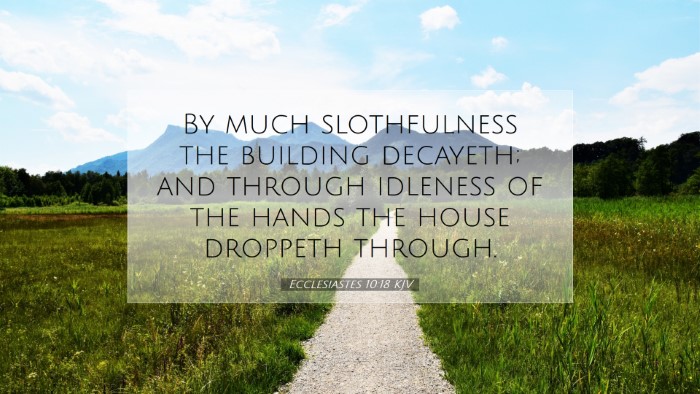Ecclesiastes 10:18 - Commentary Summary
Ecclesiastes 10:18 states: "By much slothfulness the building decayeth; and through idleness of the hands the house droppeth through." This verse presents valuable insights on the implications of laziness and neglect, particularly in the realm of work and responsibilities. Below, we explore combined commentary insights from public domain sources.
Overview of the Verse
The essence of Ecclesiastes 10:18 centers around the consequences of sloth and idleness. The writer uses the metaphor of a house to illustrate the larger principle of life and labor. The house symbolizes not just a physical structure, but the various aspects of life that require diligence and attention.
Commentary Insights
Matthew Henry's Commentary
Matthew Henry observes that slothfulness is the root cause of decay in any endeavor. He emphasizes that laziness leads to deterioration, both materially and spiritually. In his view, work is ordained by God, hence neglecting one’s duties, whether in personal life or ministry, invites ruin. Henry notes:
- Necessity of Diligence: He states, “Diligence is an essential virtue, and its absence leads to the downfall of both structures and lives.”
- Spiritual Application: Henry draws a parallel to spiritual care: “Just as a house falls into disrepair without timely maintenance, so too does the soul without regular devotion and discipline.
Albert Barnes' Commentary
Albert Barnes provides a thorough examination of this verse in the context of practical life. He posits that the metaphor of a house represents one’s life and personal ambitions. According to Barnes, the “building” symbolizes progress and achievements that require consistent effort, and he elaborates:
- Consequences of Idleness: Barnes accentuates that idleness fosters a detrimental cycle: “When one becomes idle, not only does advancement stall, but existing structures begin to deteriorate.”
- Warning Against Complacency: He urges readers to remain vigilant, stating, “A lack of activity leads to a gradual sinking of all one has built, both materially and spiritually.”
Adam Clarke's Commentary
Adam Clarke reflects on the verse with a focus on the metaphorical implications of a falling house. He suggests that the house stands for not only physical efforts but also the inner sanctum — an individual’s spiritual and moral foundation. Concerning this interpretation, Clarke notes:
- Role of Hard Work: He asserts that “hard work is necessary to ensure that what is built remains intact,” emphasizing that diligence fosters stability.
- Moral Undertones: Clarke recognizes a moral dimension, indicating that “spiritual neglect often leads to a moral collapse, akin to a physical structure succumbing to decay.”
Broader Implications of Ecclesiastes 10:18
The verse serves as a poignant reminder of the balance required between effort and spiritual vigilance. Each commentary reinforces the notion that diligence is not merely a virtue, but a necessity.
- Practical Applications:
- In personal lives, this reflects the importance of maintaining relationships, health, and financial responsibilities.
- In ministry, it highlights the need for pastors and church leaders to stay active in their duties to prevent spiritual decline in congregations.
- Theological Reflections: The combination of work and faith illustrates a holistic approach to life, integrating spirituality with daily responsibilities.
Conclusion
Ecclesiastes 10:18 encapsulates profound wisdom regarding the necessity of diligence and the dangers of slothfulness. Each commentator enriches the understanding of this verse by linking practical advice with spiritual significance. For pastors, students, theologians, and scholars, it is evident that embracing a proactive life is essential for both material and spiritual flourishing.


